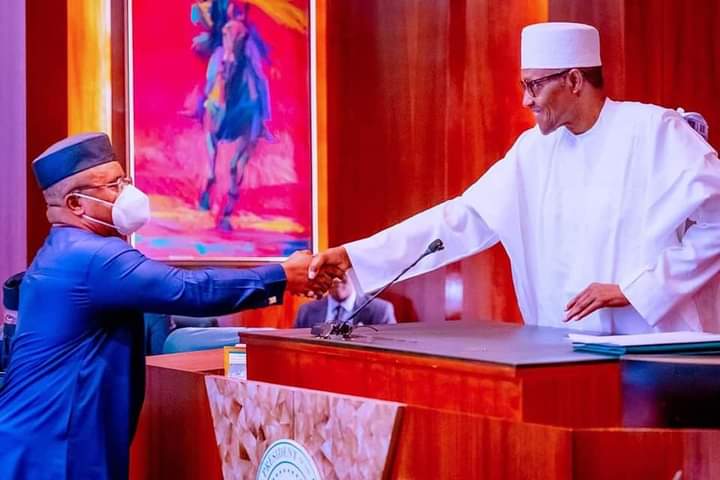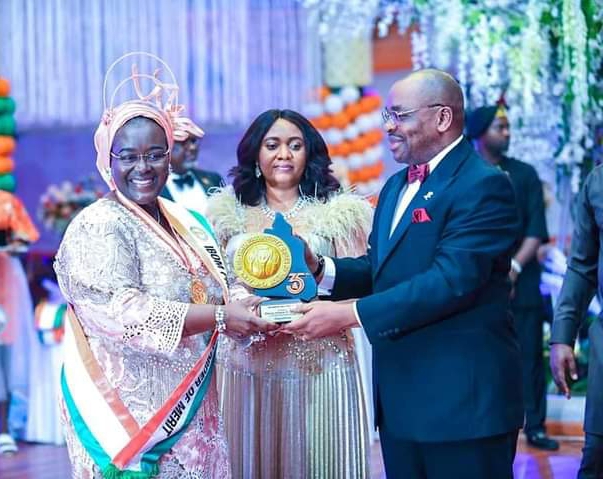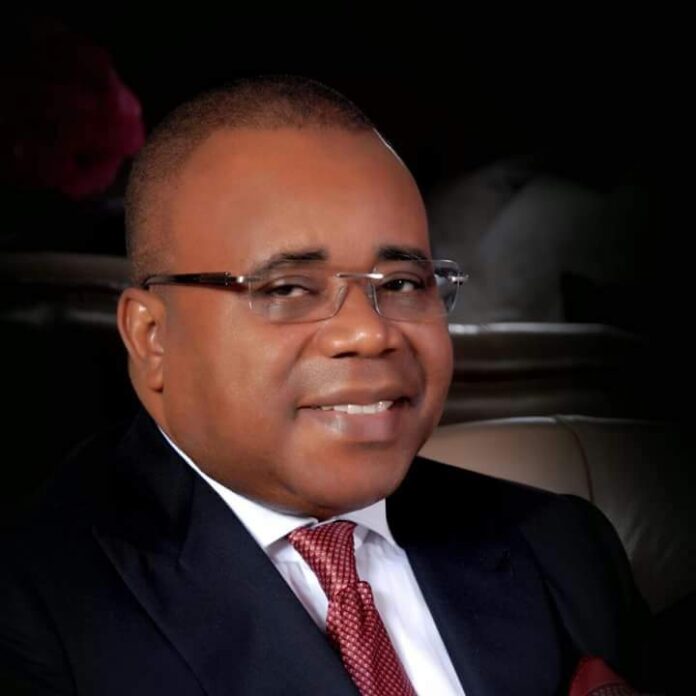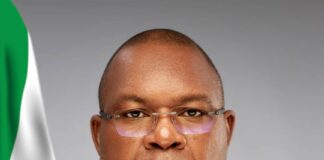Mr. Umana Umana, Minister of Niger Delta Affairs. (Photo credit: Facebook.)
By Abasifreke Effiong
The Akwa Ibom State government on Saturday 24th September honoured Mr. Umana Umana, the Honourable Minister of Niger Delta Affairs with the State merit award for patriotism, at a State banquet to mark Akwa Ibom’s 35th anniversary. The well- deserved recognition and honour conferred on Umana did not come as a surprise to those who have kept close tabs on the invaluable development contributions the honouree has made in the State, especially in the last seven years, using his good offices at the federal level.
Umana is not a member of the ruling Peoples Democratic Party in Akwa Ibom State. He contested for the governorship of the State on the platform of the All Progressives Congress, against the incumbent Governor, Mr. Udom Emmanuel. After a protracted post-election litigation in 2015, Umana got a federal appointment as Director General and CEO of Nigeria’s foremost Oil and Gas Free Zones Authority, OGFZA. The OGFZA is the national regulatory agency which oversees the operations of oil and gas trade zones in Nigeria.
When Umana assumed duty at the OGFZA, many people might have expected him to use his position to fuel a new dimension of cantankerous opposition against the ruling opposition party in his State as the norm has been. Typical of him, he chose his own path and style, cleverly disappointing the unprogressive expectation of this set of thinkers. In doing so, the torrent of choleric confrontation and atavism against the government of the State was extinguished.
Against all expectations, when Umana assumed duty at the OGFZA, he paid a working visit to his State Governor, Mr. Emmanuel, not minding that he was the opponent who stopped his chance of emerging governor of the State in 2015. Through that visit, he pointed the government to the huge development opportunities the State can tap into in the oil and gas trade zone leveraging on its combined advantage as a major oil and gas producing State and its expansive maritime belt which is a huge window into the Gulf of Guinea. With open arms, Governor Emmanuel welcomed the collaboration and that gave birth to a new, amazing level of service and patriotism to the State. In less than four years, that collaboration earned the State a federal government’s approval for the establishment of the largest and latest oil and gas free zone in Nigeria called the Liberty Oil and Gas Free Zone (LOGFZ). With LOGFZ, there are now five oil and gas free trade zones in the country, namely; Onne oil and gas free zone, Brass oil and gas city, Warri oil and gas free zone, and Eko support free zone.
 Mr. Umana Umana receiving a handshake from President Muhammadu Buhari, after his swearing-in as Minister of Niger Delta Affairs. Credit : Facebook/Femi Adesina.
Mr. Umana Umana receiving a handshake from President Muhammadu Buhari, after his swearing-in as Minister of Niger Delta Affairs. Credit : Facebook/Femi Adesina.
While addressing stakeholders of his party (APC) in Uyo on Sunday 11th April, 2021, Umana said the LOGFZ covering a landmass of 50,215 hectare is the largest oil and gas free zone in Africa. At the last check, 12 companies with a combined investment portfolio of more than US$15 billion had already been licensed to operate in the area. The Liberty oil and gas free zone attracted to the State by Umana is one of the most futuristic lifetime “legacies of impact” in the State counted for the Emmanuel-led administration.
It is rare to find a politician who would devote sufficient attention to supporting his opponent to succeed. Our political system is deeply polarised. Instead of building collaborations and partnerships that would alleviate the common problems of the people and improve their quality of life, political office holders in opposing parties usually prefer to exacerbate and exploit vulnerabilities to further their personal, political, religious and pecuniary interests. We have seen also how appointees and members of the same political party who think they might have a chance someday to take a shot at public leadership hide ideas and hold back solutions that could be useful to their leaders and the people at a time. They do this with mischievous and selfish intent – so that if given opportunity to lead, they will shine with those ideas and no one else will share in the credit. Personification and personalisation of achievement has become deeply rooted in our political culture and daily life. This does not encourage creativity, loyalty, forbearance and generosity in sharing ideas among teams both in private and public spheres. In this kind of system, a politician who knows that he won’t share in the credit, public praise and ovation for an achievement made, yet goes ahead to make his contributions magnanimously and generously, is a statesman.
READ: Osinbajo’s novel ideas on climate change
Umana Umana is a statesman. He has evolved a new positive dimension to opposition politics – an opposition which places premium on co-creation of development through partnership. He has earned the ovation of Akwa Ibom people, their respect, honour and love. He deserves the best tributes for his exceptionally excellent leadership style and statesmanship. Political theorists Patrick Overeem and Femke Bakker define statesmanship as an exceptional form of leadership. It means a ‘morally excellent leadership at the polity level’. Beyond the four cardinal virtues – prudence, justice, courage and temperance – identified by Aristotle, magnanimity and generosity especially towards one’s opponents within the polity are important characteristics of statesmen. Umana has served Akwa Ibom State earnestly, selflessly, compassionately, committedly, humbly and magnanimously, demonstrating sufficient foresight, purpose, love and good intentions to her people. This has earned him the highly -prized leadership honour of statesmanship.
Attracting and facilitating the approval of the Liberty oil and gas free zone for Akwa Ibom state is not the first of such outstanding and selfless intervention Umana has made for his people. As documented by an ace journalist, Etim Etim in his book, “Akwa Ibom Heroes. Inside story of the fight for Abrogation of onshore-offshore oil dichotomy”, it is worthy of note that it was Umana who got President Olusegun Obasanjo to give presidential approval for the implementation of the onshore-offshore Abrogation Act. Etim reported that after all efforts made by the then governor of Akwa Ibom State, Obong Victor Attah and other governors in the Niger Delta to secure Obasanjo’s approval for the payment of the 13 percent derivation after the Supreme Court validation of the 2004 Abrogation Act hit a brick wall, Umana saved the day for the Niger Delta region. His initiative – going to explain to Obasanjo with computed data, that the implementation of the 13 percent would not reduce the allocation to other states by more than N10 million – was what convinced Obasanjo to give the much needed approval for the commencement of the implementation of the onshore/offshore Abrogation Act. In the book, Umana recounted, “I informed Governor Attah who promptly granted me approval to go and see the President. I arrived Abuja with all my documents and computations and was soon taken to the Villa to see the President. I showed the President my computations which proved that the other states would not lose much (not more than N10 million each month) if Akwa Ibom received all its due. The President was convinced and said that he would have implemented the Act long earlier if he had been so informed”. Umana also played strategic, unsung roles under the Chief Godswill Akpabio administration to get the administration of Late President Umaru Musa Yar’Adua to revisit the case of the 176 oil wells that were taken from Akwa Ibom State. The State got back some of her ceded oil wells through that effort.
 Mr. Udom Emmanuel, Governor of Akwa Ibom State with his wife Mrs. Martha Emmanuel, (middle) presenting a memento to the wife of the Minister of Niger Delta Affairs, Mrs. Florence Umana, who represented her husband at the State Banquet marking Akwa Ibom at 35 where Mr. Umana was honoured with a State Merit Award for Patriotism. (Credit : Facebook/Press Unit, Govt. House, Uyo.)
Mr. Udom Emmanuel, Governor of Akwa Ibom State with his wife Mrs. Martha Emmanuel, (middle) presenting a memento to the wife of the Minister of Niger Delta Affairs, Mrs. Florence Umana, who represented her husband at the State Banquet marking Akwa Ibom at 35 where Mr. Umana was honoured with a State Merit Award for Patriotism. (Credit : Facebook/Press Unit, Govt. House, Uyo.)
Umana is not a run-of-the-mill politician. He is a technocrat, administrator par excellence, economic and finance expert, policy and governance advisor. He is a foresighted, inspirational and intentional leader, peaceful, trustworthy, magnanimous, and full of creative initiatives. He is an excellent listener and a man of deep intelligence. Little wonder he was fondly called the “engine room of government” when he served as Secretary to Akwa Ibom State Government between June 2007 – July 2013.
In his current appointment as Minister of Niger Delta Affairs, Umana is creating partnership and synergy with all the States in the region without prejudice or preference to political parties. This is how it should be. Partnership and development beyond political parties. On Wednesday 14th September, Umana and management team of the Ministry of Niger Delta Affairs were on a courtesy call to Governor Udom Emmanuel. At that meeting, the Minister made an instructive statement which will hopefully change the usual trajectory of engagement between the Ministry and States in the region. He said, “we are taking steps to ensure that we can change the future, if we cannot do much about the past. We have started a process of consulting with State governors before projects are embarked upon, we don’t want a situation where governors sit and then find out that work is starting in their States and what is going on may not fit into the development plans of the various State…”. Lack of consultation and synergy between the NDDC and States in the region has been a top-burner issue. Within just few months since his appointment, Umana has shown commitment that things will be done properly at the NDDC.
















